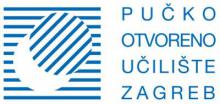
Partner
The Public Open University of Zagreb (POUZ) is the largest non-profit institution dedicated to older adults’ education in Croatia. Its history goes back to 1907, when it was established as a university extension. Its goal of satisfying the needs of education of adults has continued for more than 100 years, the city of Zagreb itself, I.E. the municipal authorities, being the founder of POUZ.
It offers a wide range of educational programmes: from primary and secondary school programmes, including vocational training and retraining courses. POUZ is mainly oriented to the professional training of (both employed and unemployed) older adults for the labour market, although it also boasts art and culture courses (art workshops, music programmes and heritage).
Students can choose and enrol in one of the eighteen secondary school programmes offered by the Secondary Education Department according to their interests, and they can complete it through a three-or-four-year school term or through a retraining course.
These programmes cover a wide range of interests: tourism, catering, administration and economy, construction and energy, media, health care, agriculture and others. In addition to secondary school programmes, students can register for retraining programmes which also include various options, as well as the Secondary Education Department, with the additional option of attending specialized programmes.
The University of the Third Age (U3A) is a department within the Public Open University of Zagreb (POUZ) that has been offering educational programmes to 55+ adult for the last 27years. The U3A is the result of the cooperation between POUZ and the Faculty of Humanities and Social Sciences in Zagreb. The U3A is composed of a structured educational and cultural programmes unit. These programmes cover a wide spectrum of conferences aimed at seniors such as non-formal education in foreign languages, computer skills, lectures and workshops on history, painting, art history, health, etc. This, along with the possibility of choosing the type and level of knowledge to be improved, gives the programme an added value in terms of education. Programmes take place during the winter semester (which starts in mid-October); during the spring semester (which starts at the end of February) and during the summer school (June). Lectures are held once a week, in two school periods from 9:00 a.m. to 3:00 p.m., with a total duration of 60 school periods per year (32 periods in winter and 28 periods in the spring semester). Some 900 students register for U3A programmes each year. In addition to lectures, the U3A also offers a wide variety of extracurricular activities. Some of them are the film club, museums and galleries, open lectures, etc. It is important to highlight that the principles of an open group as well as the equality between students and mentors are respected in classes, which allows students to include their own knowledge and personal experience in the programmes, thus becoming innovators in the older adult teaching methodologies. The U3A also publishes a digital newsletter called Treća Mladost (Third Youth) and participates in numerous European (Mobility) projects. The U3A is A member of IAUTA (International Association of Universities of the Third Age) and of the international association DANET (Danube-Networkers for Europe).
The POUZ Cultural Centre offers fifty different programmes each year, divided into: art workshops, musical activities, dances, open art academy for children and young people, digital culture programmes, business education in culture, international programmes and exhibitions and activities in museums. The programmes are carried out through cycles of lectures, pedagogical and practical work in art workshops with state aids and teaching methods, seminars, debates, trips, activities, events, shows, competitions, exhibitions and programmes in collaboration with other centres. All the above speaks in favour of the POUZ, since it proves to be a permanent learning institution in every possible sense.